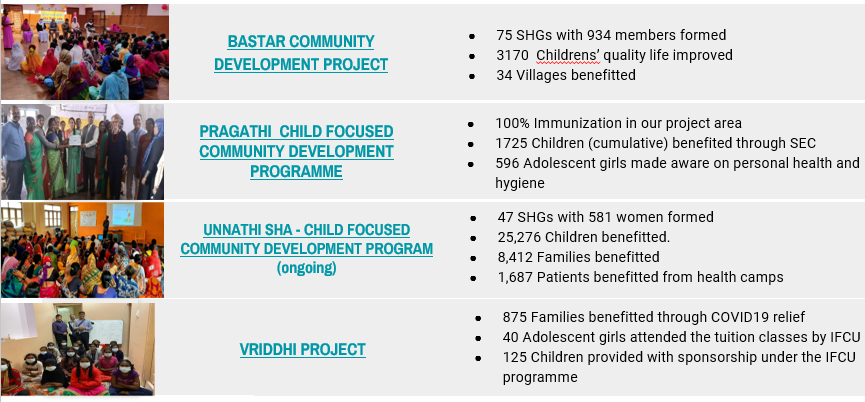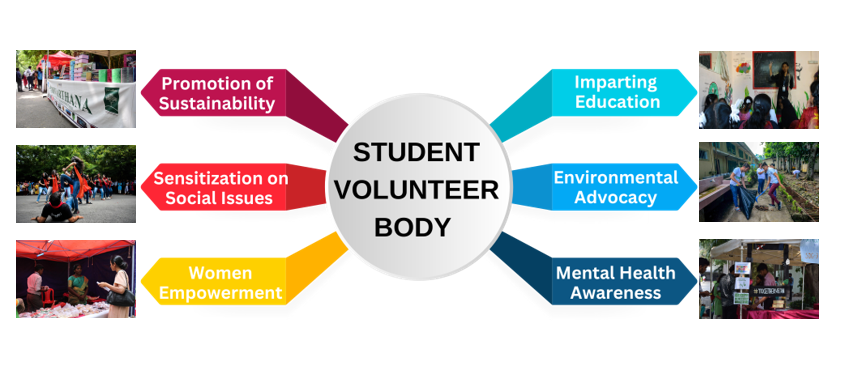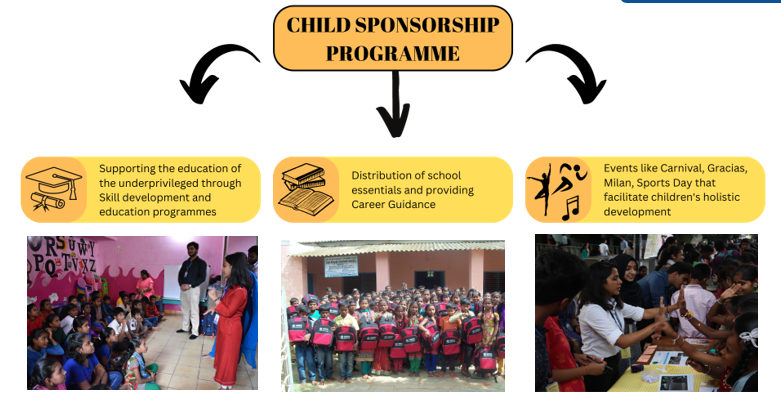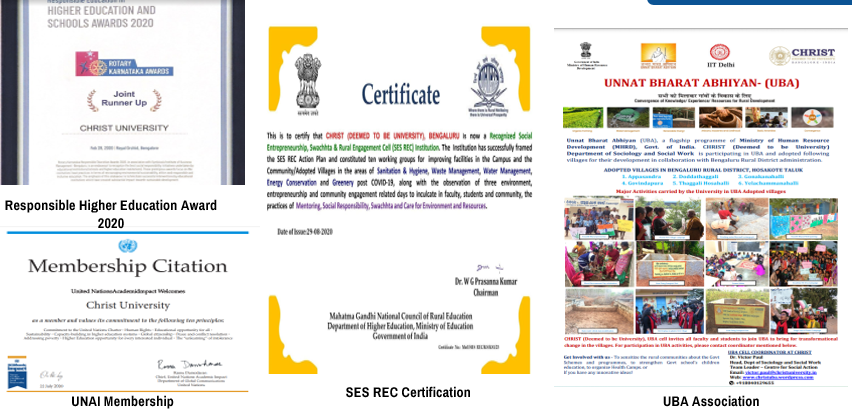Institutional Distinctiveness
Drawing inspiration from its Vision, Mission and core values, CHRIST aims to promote the Atma Nirbhar Bharat Abhiyan of the country to create a self-reliant and sustainable atmosphere, nurturing social responsibility among staff and students through Centre for Social Action (CSA), Parivarthana, Green audit Green army and sustainability cells.
CHRIST (Deemed to be University) strongly believes that education is for the development of persons and for life. It strives to integrate the sense of responsibility for the development of fellow human beings in all its three thrust areas, namely, teaching-learning, research and service. The University strives to achieve this aim through curricular, co curricular, extracurricular activities for students-including those that connect to real-life situations, staff training programmes and social projects, supported through its departments, centres and offices
‘Building Sustainable Development Ethos in Students through Community Engagement” is the distinctiveness highlight of the institution. CHRIST has developed distinctiveness in building sustainable development ethos in students through:
- Community Engagement Activities ( Centre for Social Action)
- Service Learning internships
- Student voluntarism and
- Waste management
Centre for Social Action (CSA) facilitates Sustainable Changes by contributing to Social Sensitisation Programmes through student’s volunteers and undertakes Community Development Projects for the poor and marginalised. CSA Create a community of empathetic students who can work proactively for the benefit of society
The Centre for Social Action is implementing community projects in the following areas:
Unnathi project in Jamkhandi, District Bagalkot, Karnataka (11 villages in Jamkhandi), Bastar Community Development Project in Kanker District, Chhattisgarh (34 villages in Kanker district, Bastar).
After 5 to 7 years of implementation, the following projects are now being supported by locally registered Federations.
Chetna Project in Hoskote, Bangalore Rural District, Karnataka, Pragathi Project in Yeldur, Kolar District, Karnataka, MHCDP (Manikgarh Hills Community Development Project), Jiwathi Project in Chandrapur District, Maharashtra, and Nirmal Project in Nirmal District, Telangana state.
The community projects have aided in the achievement of the following SDGs:
- SDG 3 -Good Health and wellbeing,
- SDG 4- Quality Education,
- SDG 5 - Gender Equality,
- SDG6 - Clean water and Sanitation,
- SDG 8 - Decent Work and Economic Growth,
- SDG 17 – Partnership with likeminded NGOs
The various projects aided in the development of the community, and the following are some of the general impacts the Centre for Social Action had on society:
- Health camps and awareness programmes on topics such as health, child marriage, the importance of education, and gender equality are organised through rallies and street plays.
- School bags, stationery, note books, question banks, and drawing books were distributed as educational materials.
- SHG members receive training in the areas of livelihood, government schemes, entrepreneurship, clothing, food products, animal husbandry, and improved agricultural methods. • Women make up more than 70% of the membership.
- Child marriages are decreasing.
- Built and maintained toilets and drinking water facilities
- Enabled IGP loans to assist tribal families in starting small businesses.
Climate change initiatives
- 1250 sapling has been distributed in community through network with forest department
- 650 people attended in the climate change training
Water and Sanitation
- SHG women are aware on drinking water, through govt. Scheme
- 21 villages received high raised water tank for safe drinking water
Gender Equality
- Women are fighting against domestic violence
- Women are focusing the girl child education
- Women taking leadership at home and village meetings
Health
- 748 women took part in health awareness training on nutrition, vaccination, immunisation, and mother and child health; and 560 adolescents took part in health training during puberty and drug awareness.
- 7 free health check-up camps were organised, with 840 people receiving free treatment.
- 900 families received vegetable seeds to promote nutritional kitchen gardens;
- 1280 children received free tuition through Education: Supplementary Education Centre;
- 520 children received educational and recreational materials; and
- 820 children participated in CRSA training to learn about their educational rights.

Service learning
Service learning is a pedagogical practise that engages students in community service through disciplinary curriculum. In 2014, the University incorporated service learning into the undergraduate curriculum. The University has established a Centre for Service Learning to ensure benchmarking practises and curriculum, conduct research, and promote advocacy in Service Learning. Some of the community impacts created by service learning initiatives are listed below.40 Children trained through Skill Development program in Community (Sneha Gram).
- Through the Srujana project, 250 children in the community were trained in English language skills.
- Six departments, including Psychology, Sociology, Social Work, Commerce, English, and the Department of Professional Studies, assisted children in the community with nutrition and well-being.
Student Volunteerism in Community Development:
Beyond department and discipline-specific Service Learning, many University-level platforms and initiatives are being developed for direct community engagement by students from across the University. The following are some of the university students' volunteer activities: child sponsorship, educational programmes, awareness sessions on topics such as substance abuse, waste management, women empowerment, sustainable menstruation, and so on.
Engineering students participating in this initiative take on rural problems and apply their subject knowledge to find and implement solutions to social issues identified by them. These issues are studied as research or social projects over the course of a semester.
Link to the Initiative: https://e-sail-web-christuniversity.web.app/#index
Zero Waste:
Parivarthana, the University's Recycling Initiative, has evolved as a model for all higher educational institutions seeking to protect the environment through waste management. The Parivarthana Unit manages over 1000 kg of waste per day, with 20% wet waste and 80% dry waste. This unit also recycles 3-4 lakh litres of water per day, which is then used for gardening and vegetation.
The Team Parivarthana-student volunteers, Recycling Unit staff, and Student Council raise waste management awareness and instil best waste management practises such as reduce, reuse, and recycle among University students and staff. Paper recycling is carried out in order to produce recycled paper and stationery with the assistance of MBA students for design, marketing, and sales. Food waste is used to produce cooking gas, which produces approximately 24 kg of gas per day. The Recycling Unit is managed by women from the surrounding communities, providing them with a source of income.
Emergency Response: Emergency response an initiative to involve students and faculty in responding to both natural and man-made disasters and situations. Students have been involved in relief work in many natural disasters.
During the pandemic, students were involved in the following COVID-19 relief work:
- 1,030 survival kits (5 kg rice, 1 kg sugar, 1 kg oil, 100 gm each masala powders, 500 gm daal & 1 kg wheat flour, sanitizer, face masks and soaps) were distributed in three urban slums and 81 villages adopted by the University in Chhattisgarh and Karnataka, benefiting 4,120 people.
- Protection Kits (Sanitizer, face masks, and soaps) were distributed to families of sponsored children in Bengaluru's L R Nagar and Janaki Ram slums and villages, benefiting 4,500 people.
- With the help of the local panchayat, 5,000 masks were distributed in Kainakary, Alleppey district, Kerala.
- A makeshift shelter for migrants was set up at Bommanahalli Boys hostel.
General Highlights
- Centre for Social Action (CSA) operates in the field of child rights, socio economic issues, community mobilization, and climate change in 137 villages in Karnataka, Kerala, Maharashtra, the National Capital Region and Chhattisgarh
- Activities: Visits to rural and urban slums, orphanages, and old age homes, and exposure visits
- Every year, the volunteer programme contributes towards improvement of education and health of 850 children
- Rural Health Camps for the Community (women’s health, immunisation drive for children, screening for juvenile diabetes etc.)
- Cleanliness Drive under Swachh Bharat Summer Internship programme in Hoskote village
- The students in collaboration with the local government engaged in the restoration of lakes in and around Bangalore.
- Regular anti-addiction awareness campaigns in High schools, colleges and communities.
- Promotion of livelihood among women (food service, marketing, business development, etc.)
- International Student volunteer activities: Service Learning, Internships, Social Research and Field-based studies.
- Partnership with United Nations on UNAI and UNDP
- Partnered with the Ministry of Human Resources Development(MHRD) for the “UNNAT BHARAT ABHIYAN”
×
Overview
Drawing inspiration from its Vision, Mission and core values, CHRIST aims to promote the Atma Nirbhar Bharat Abhiyan of the country to create a self-reliant and sustainable atmosphere, nurturing social responsibility among staff and students through Centre for Social Action (CSA), Parivarthana, Green audit Green army and sustainability cells.
CHRIST (Deemed to be University) strongly believes that education is for the development of persons and for life. It strives to integrate the sense of responsibility for the development of fellow human beings in all its three thrust areas, namely, teaching-learning, research and service. The University strives to achieve this aim through curricular, co curricular, extracurricular activities for students-including those that connect to real-life situations, staff training programmes and social projects, supported through its departments, centres and offices
‘Building Sustainable Development Ethos in Students through Community Engagement” is the distinctiveness highlight of the institution. CHRIST has developed distinctiveness in building sustainable development ethos in students through:
- Community Engagement Activities ( Centre for Social Action)
- Service Learning internships
- Student voluntarism and
- Waste management
Centre for Social Action (CSA) facilitates Sustainable Changes by contributing to Social Sensitisation Programmes through student’s volunteers and undertakes Community Development Projects for the poor and marginalised. CSA Create a community of empathetic students who can work proactively for the benefit of society
The Centre for Social Action is implementing community projects in the following areas:
Unnathi project in Jamkhandi, District Bagalkot, Karnataka (11 villages in Jamkhandi), Bastar Community Development Project in Kanker District, Chhattisgarh (34 villages in Kanker district, Bastar).
After 5 to 7 years of implementation, the following projects are now being supported by locally registered Federations.
Chetna Project in Hoskote, Bangalore Rural District, Karnataka, Pragathi Project in Yeldur, Kolar District, Karnataka, MHCDP (Manikgarh Hills Community Development Project), Jiwathi Project in Chandrapur District, Maharashtra, and Nirmal Project in Nirmal District, Telangana state.
The community projects have aided in the achievement of the following SDGs:
- SDG 3 -Good Health and wellbeing,
- SDG 4- Quality Education,
- SDG 5 - Gender Equality,
- SDG6 - Clean water and Sanitation,
- SDG 8 - Decent Work and Economic Growth,
- SDG 17 – Partnership with likeminded NGOs
The various projects aided in the development of the community, and the following are some of the general impacts the Centre for Social Action had on society:
- Health camps and awareness programmes on topics such as health, child marriage, the importance of education, and gender equality are organised through rallies and street plays.
- School bags, stationery, note books, question banks, and drawing books were distributed as educational materials.
- SHG members receive training in the areas of livelihood, government schemes, entrepreneurship, clothing, food products, animal husbandry, and improved agricultural methods. • Women make up more than 70% of the membership.
- Child marriages are decreasing.
- Built and maintained toilets and drinking water facilities
- Enabled IGP loans to assist tribal families in starting small businesses.
Climate change initiatives
- 1250 sapling has been distributed in community through network with forest department
- 650 people attended in the climate change training
Water and Sanitation
- SHG women are aware on drinking water, through govt. Scheme
- 21 villages received high raised water tank for safe drinking water
Gender Equality
- Women are fighting against domestic violence
- Women are focusing the girl child education
- Women taking leadership at home and village meetings
Health
- 748 women took part in health awareness training on nutrition, vaccination, immunisation, and mother and child health; and 560 adolescents took part in health training during puberty and drug awareness.
- 7 free health check-up camps were organised, with 840 people receiving free treatment.
- 900 families received vegetable seeds to promote nutritional kitchen gardens;
- 1280 children received free tuition through Education: Supplementary Education Centre;
- 520 children received educational and recreational materials; and
- 820 children participated in CRSA training to learn about their educational rights.

Service learning
Service learning is a pedagogical practise that engages students in community service through disciplinary curriculum. In 2014, the University incorporated service learning into the undergraduate curriculum. The University has established a Centre for Service Learning to ensure benchmarking practises and curriculum, conduct research, and promote advocacy in Service Learning. Some of the community impacts created by service learning initiatives are listed below.40 Children trained through Skill Development program in Community (Sneha Gram).
- Through the Srujana project, 250 children in the community were trained in English language skills.
- Six departments, including Psychology, Sociology, Social Work, Commerce, English, and the Department of Professional Studies, assisted children in the community with nutrition and well-being.
Student Volunteerism in Community Development:
Beyond department and discipline-specific Service Learning, many University-level platforms and initiatives are being developed for direct community engagement by students from across the University. The following are some of the university students' volunteer activities: child sponsorship, educational programmes, awareness sessions on topics such as substance abuse, waste management, women empowerment, sustainable menstruation, and so on.
Engineering students participating in this initiative take on rural problems and apply their subject knowledge to find and implement solutions to social issues identified by them. These issues are studied as research or social projects over the course of a semester.
Link to the Initiative: https://e-sail-web-christuniversity.web.app/#index
Zero Waste:
Parivarthana, the University's Recycling Initiative, has evolved as a model for all higher educational institutions seeking to protect the environment through waste management. The Parivarthana Unit manages over 1000 kg of waste per day, with 20% wet waste and 80% dry waste. This unit also recycles 3-4 lakh litres of water per day, which is then used for gardening and vegetation.
The Team Parivarthana-student volunteers, Recycling Unit staff, and Student Council raise waste management awareness and instil best waste management practises such as reduce, reuse, and recycle among University students and staff. Paper recycling is carried out in order to produce recycled paper and stationery with the assistance of MBA students for design, marketing, and sales. Food waste is used to produce cooking gas, which produces approximately 24 kg of gas per day. The Recycling Unit is managed by women from the surrounding communities, providing them with a source of income.
Emergency Response: Emergency response an initiative to involve students and faculty in responding to both natural and man-made disasters and situations. Students have been involved in relief work in many natural disasters.
During the pandemic, students were involved in the following COVID-19 relief work:
- 1,030 survival kits (5 kg rice, 1 kg sugar, 1 kg oil, 100 gm each masala powders, 500 gm daal & 1 kg wheat flour, sanitizer, face masks and soaps) were distributed in three urban slums and 81 villages adopted by the University in Chhattisgarh and Karnataka, benefiting 4,120 people.
- Protection Kits (Sanitizer, face masks, and soaps) were distributed to families of sponsored children in Bengaluru's L R Nagar and Janaki Ram slums and villages, benefiting 4,500 people.
- With the help of the local panchayat, 5,000 masks were distributed in Kainakary, Alleppey district, Kerala.
- A makeshift shelter for migrants was set up at Bommanahalli Boys hostel.
General Highlights
- Centre for Social Action (CSA) operates in the field of child rights, socio economic issues, community mobilization, and climate change in 137 villages in Karnataka, Kerala, Maharashtra, the National Capital Region and Chhattisgarh
- Activities: Visits to rural and urban slums, orphanages, and old age homes, and exposure visits
- Every year, the volunteer programme contributes towards improvement of education and health of 850 children
- Rural Health Camps for the Community (women’s health, immunisation drive for children, screening for juvenile diabetes etc.)
- Cleanliness Drive under Swachh Bharat Summer Internship programme in Hoskote village
- The students in collaboration with the local government engaged in the restoration of lakes in and around Bangalore.
- Regular anti-addiction awareness campaigns in High schools, colleges and communities.
- Promotion of livelihood among women (food service, marketing, business development, etc.)
- International Student volunteer activities: Service Learning, Internships, Social Research and Field-based studies.
- Partnership with United Nations on UNAI and UNDP
- Partnered with the Ministry of Human Resources Development(MHRD) for the “UNNAT BHARAT ABHIYAN”

.png)






.png)





